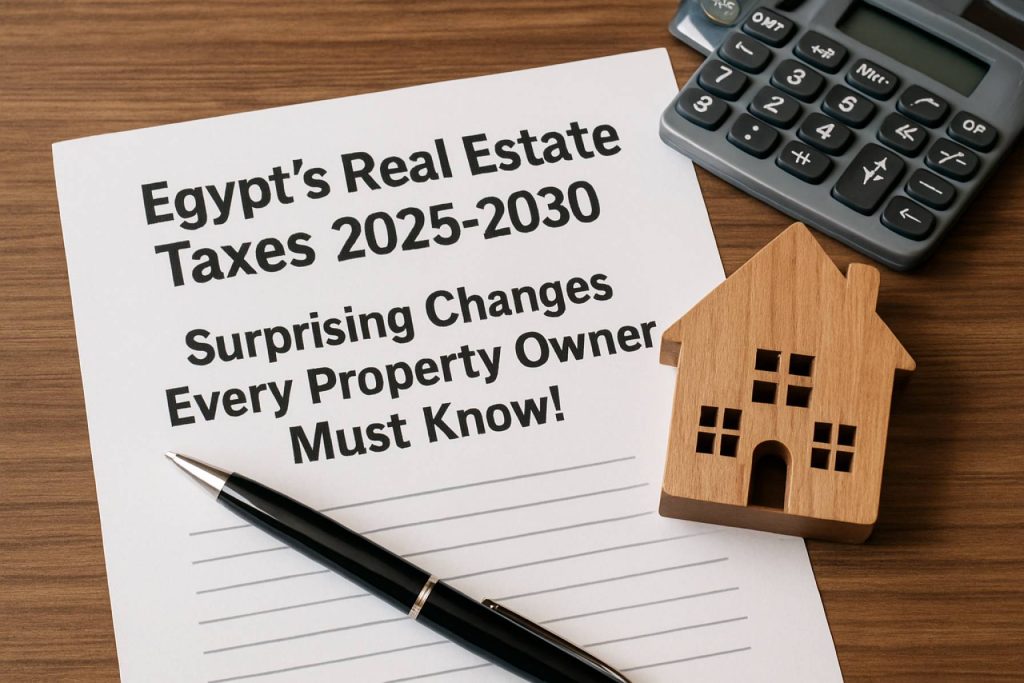
Table of Contents
- Introduction: Why Egyptian Real Estate Taxes Matter in 2025
- Overview of Current Real Estate Tax Laws in Egypt
- Key Government Authorities and Official Guidelines
- Understanding Property Tax Assessment and Valuation Methods
- Major 2025 Tax Reforms: What’s New and Why
- Compliance Requirements and How to Stay Legal
- Penalties and Enforcement: What Happens If You Don’t Comply?
- Key Statistics: Revenue, Exemptions, and Taxpayer Data (Citing mof.gov.eg)
- Future Outlook: Predicted Changes Through 2030
- Expert Tips and Official Resources for Property Owners
- Sources & References
Introduction: Why Egyptian Real Estate Taxes Matter in 2025
Egypt’s real estate sector stands as one of the country’s most dynamic economic pillars, directly influencing urban development, employment, and fiscal policy. Real estate taxes—specifically the property tax (known locally as “العقار الضريبي”)—have gained heightened relevance in 2025 as the Egyptian government intensifies its efforts to expand the tax base, boost public revenues, and formalize informal realty markets. The legal foundation for property taxes is established under Law No. 196 of 2008 and its subsequent amendments, which set the framework for assessment, collection, and exemptions, with the Egyptian Tax Authority overseeing enforcement and compliance.
Recent years have witnessed a series of reforms and enforcement drives. In 2023–2024, the government initiated aggressive campaigns to update property records, digitize payment systems, and clamp down on tax evasion, resulting in a measurable uptick in formal declarations and collections. As of mid-2024, official data indicates real estate tax revenues exceeded EGP 7.2 billion, marking a steady annual growth rate of over 12% since 2021 (Egyptian Tax Authority). The government’s 2025 fiscal plan projects further increases, targeting broader compliance through digital platforms and stricter penalties for non-compliance.
Compliance remains a central challenge and opportunity. Property owners—residential and commercial alike—are mandated to file declarations and pay annual dues, with exemptions available for properties valued below EGP 2 million and certain non-profit or state-owned assets. In 2025, penalties for late or false declarations have been increased, and authorities are leveraging cross-agency data sharing to identify undeclared or underreported assets (Egyptian Tax Authority). The Ministry of Finance has also rolled out public awareness campaigns and online portals to streamline compliance.
Looking ahead, real estate taxes are poised to play an increasingly strategic role in Egypt’s fiscal consolidation and urban policy. As the government grapples with funding infrastructure, housing, and inflationary pressures, real estate taxation is expected to yield both fiscal and regulatory dividends. For investors, developers, and homeowners, staying abreast of evolving regulations and compliance requirements will be crucial in 2025 and beyond.
Overview of Current Real Estate Tax Laws in Egypt
Egypt’s real estate tax regime is governed primarily by Real Estate Tax Law No. 196 of 2008 and its subsequent amendments. The law imposes a recurring annual tax on constructed real estate properties—both residential and non-residential—excluding land plots. The Egyptian Tax Authority oversees taxation, assessment, and compliance mechanisms. In 2025, the tax remains applicable to all property owners, with liability determined by property value, usage, and geographic location.
For residential properties, exemptions apply if the property is the taxpayer’s main residence and its tax-assessed value does not exceed EGP 2 million, as stipulated by recent amendments. Properties valued above this threshold are taxed at a rate of 0.1% of the assessed value per year. Commercial and non-residential properties are subject to the same 0.1% rate, but without the main-residence exemption. The law requires property owners to submit declarations to the tax authority, even for exempt properties, to maintain compliance and avert penalties. The valuation process, conducted by committees, is updated every five years; the current cycle applies until 2028 Egyptian Tax Authority.
Recent years have seen efforts to enhance compliance and broaden the tax net. The Ministry of Finance introduced digital tax payment portals and awareness campaigns to encourage voluntary compliance. According to official statistics, real estate tax revenues exceeded EGP 6 billion in fiscal year 2023/2024, with projections of moderate growth as enforcement and digitization improve Ministry of Finance. The government has also intensified audits of high-value properties and commercial assets, with increased penalties for non-compliance, including fines and potential property seizures.
Looking ahead to 2025 and beyond, policymakers are weighing further updates to valuation practices to reflect market changes and inflation. There is ongoing discussion about adjusting exemption thresholds and enhancing data sharing between government agencies to improve accuracy. With Egypt’s population growth and urban expansion, real estate tax is expected to remain a significant revenue stream. However, compliance challenges persist, particularly in informal housing and under-declared commercial assets. The government’s continued investment in administrative modernization is anticipated to improve collection rates and transparency in the coming years.
Key Government Authorities and Official Guidelines
The administration and regulation of real estate taxes in Egypt involve several key government authorities, each responsible for different aspects of compliance, assessment, and enforcement. The primary body overseeing real estate taxation is the Egyptian Tax Authority (ETA), which operates under the supervision of the Ministry of Finance. The ETA issues guidelines, assesses property values, and collects taxes in accordance with Law No. 196 of 2008, and its subsequent amendments, which form the legislative backbone of the real estate tax regime.
- Egyptian Tax Authority (ETA): As the central tax administration, the ETA is responsible for the registration, valuation, and collection of real estate taxes nationwide. It provides official guidance on taxpayer obligations, annual deadlines, and exemptions, and manages the appeals process for disputes related to property evaluation or tax assessment. The ETA’s online portal enables property owners to access their tax status, file returns, and seek clarifications regarding compliance procedures (Egyptian Tax Authority).
- Ministry of Finance: The Ministry of Finance establishes policy direction and legislative frameworks for tax matters, including periodic adjustments to property valuation schedules and exemption thresholds. It also monitors tax revenues and strategizes on reforms to enhance compliance and collection efficiency (Ministry of Finance).
- Local Real Estate Tax Directorates: These provincial and municipal branches of the ETA carry out field assessments, maintain property registries, and liaise directly with property owners. They handle on-the-ground enforcement, property inspections, and the issuance of tax notices at the governorate and city levels.
- Official Guidelines and Compliance: Official guidance for real estate tax compliance is regularly updated on the ETA website and through ministerial decrees. Key compliance requirements as of 2025 include timely submission of property data, payment of annual dues, and adherence to any sector-specific exemptions or reductions. The government has also published detailed manuals outlining documentation, payment procedures, and channels for dispute resolution (Egyptian Tax Authority).
Looking ahead, Egypt’s tax authorities are expected to intensify digital transformation efforts, streamline assessment and collection processes, and periodically update valuation tables. Property owners should closely follow official ETA announcements and Ministry of Finance directives to ensure ongoing compliance and take advantage of any new exemptions or procedural simplifications.
Understanding Property Tax Assessment and Valuation Methods
Egypt’s real estate tax system is governed primarily by Law No. 196 of 2008 (“the Real Estate Tax Law”), as amended, and its executive regulations. The law mandates an annual tax on built properties, with a focus on both residential and non-residential units. As Egypt continues to modernize its taxation system, assessment and valuation methods have received renewed scrutiny and regulatory attention through recent ministerial decrees and ongoing digitalization initiatives.
Assessment and Valuation Process
The assessment of property tax liability is based on the property’s “annual rental value,” not market sale price. This value is determined through a mass appraisal process conducted by valuation committees under the supervision of the Egyptian Tax Authority. Committees consider factors such as location, property usage, construction materials, amenities, and local market trends. The most recent comprehensive revaluation cycle was initiated following amendments in 2013 and is scheduled to repeat every five years, with the next major review expected by 2028.
Owners must declare new properties or substantial modifications to existing ones within thirty days, triggering reassessment. The tax is calculated at a flat rate of 10% of the annual rental value, after deducting statutory allowances (30% for residential, 32% for non-residential) to account for maintenance and expenses. Exemptions are available for residential properties with a rental value below EGP 24,000 per year and for some non-profit or governmental buildings, as detailed by the Egyptian Tax Authority.
Compliance and Enforcement
Individual and corporate property owners are required to file annual returns and pay assessed taxes by June 30 each year. The Egyptian Tax Authority has increasingly digitized tax payment and declaration platforms, aiming to streamline compliance and reduce evasion. Failure to comply can result in penalties, including fines and, in persistent cases, legal proceedings.
Key Statistics and Outlook (2025 and Beyond)
According to the Ministry of Finance, real estate tax revenues have seen steady growth, contributing over EGP 7 billion in 2023/24, up from EGP 5.5 billion in 2021/22. The government’s ongoing efforts to update property records, broaden the tax base, and integrate digital tools are expected to further increase compliance and revenues in 2025 and subsequent years. As urbanization accelerates and property development expands, both the volume of taxable units and the sophistication of mass appraisal techniques are likely to rise, ensuring real estate taxation remains a critical component of Egypt’s fiscal policy.
Major 2025 Tax Reforms: What’s New and Why
The landscape of real estate taxes in Egypt is undergoing notable changes in 2025, reflecting the government’s commitment to tax reform, fiscal consolidation, and enhanced compliance. The primary legislative framework remains Law No. 196 of 2008, which governs the real estate tax regime, but recent amendments and new directives are reshaping its application and enforcement.
In 2025, one of the major developments is the continued digitalization of the real estate tax collection and assessment processes. The Egyptian Tax Authority (ETA) has been expanding its electronic platforms to facilitate property registration, tax payment, and taxpayer communication, aiming to reduce evasion and increase compliance. The ETA’s online portal now hosts comprehensive property tax services, allowing both individuals and legal entities to manage their obligations more efficiently Egyptian Tax Authority.
Another significant reform is the broadening of the taxable property base. The Ministry of Finance has moved to re-evaluate property values nationwide, targeting a more accurate reflection of current market values, especially in urban and touristic zones. This process, which began in late 2023, continues into 2025 and is projected to increase tax revenues substantially. The minimum exemption threshold remains at EGP 2 million for residential units, but luxury and commercial properties are seeing steeper assessments Ministry of Finance.
Compliance measures have tightened, with penalties for late declarations and non-payment being enforced more stringently. The ETA has also enhanced data-sharing with municipal authorities and other governmental bodies to identify unregistered or under-assessed properties. The government estimates that real estate tax revenues will grow by over 15% in FY2025/2026, driven by these reforms and intensified enforcement Egyptian Tax Authority.
Looking ahead, policymakers are considering further adjustments, including potential modifications to tax rates for commercial properties and the introduction of periodic valuation cycles to keep assessments in line with inflation and market dynamics. The outlook suggests a more robust and digitized real estate tax regime, with ongoing efforts to balance state revenue needs with taxpayer fairness and economic growth.
Compliance Requirements and How to Stay Legal
Egypt’s real estate tax regime underwent major reforms with Law No. 196 of 2008, and successive amendments have continued to reshape compliance obligations for property owners and investors. As of 2025, the Egyptian Tax Authority (ETA) maintains strict requirements regarding registration, valuation, payment, and reporting of real estate taxes, with increased digitalization and enforcement efforts.
- Registration and Valuation: Property owners—whether individuals or entities—are legally required to register their real estate assets with the ETA. Valuation is conducted by official government committees every five years, considering market values, location, and property usage. Owners must declare any new construction, acquisition, or significant changes within thirty days, as stipulated by Egyptian Tax Authority.
- Tax Payment and Filing: The annual real estate tax is due by June 30 each year, and property owners are responsible for timely payment to avoid penalties. Payment can be made through ETA offices or the official online portal. Receipts and official documents must be retained for a minimum of five years for audit purposes, in line with Egyptian Tax Authority guidance.
- Exemptions and Reductions: Certain properties—such as primary residences below a set value threshold, religious buildings, and state-owned properties—may be exempt. However, exemption requests must be formally submitted and approved, with all supporting documentation, as per Egyptian Tax Authority procedures.
- Reporting Changes: Any transfer of ownership (sale, inheritance, donation), change in use, or demolition must be reported to the ETA within thirty days. Failing to notify the authority may result in fines or the continuation of tax liabilities under the previous owner’s name.
- Digital Compliance and Enforcement: The ETA has accelerated the rollout of digital services, including online tax filing, payment tracking, and electronic notifications. This digital push is expected to reduce non-compliance, and the ETA has announced plans for increased property inspections and audits in the coming years (Egyptian Tax Authority).
Looking ahead, compliance is expected to become more streamlined but also more closely scrutinized. Property owners and investors should proactively track regulatory changes, maintain accurate records, and utilize official digital channels to stay compliant and avoid legal or financial penalties, as emphasized by the Egyptian Tax Authority.
Penalties and Enforcement: What Happens If You Don’t Comply?
Egypt’s real estate tax regime is governed primarily by Law No. 196 of 2008 and its amendments, which established the framework for registration, assessment, payment, and enforcement of property taxes. Compliance with these regulations is mandatory for owners of built real estate, whether residential, commercial, or industrial. The Egyptian Tax Authority (ETA), under the Ministry of Finance, is responsible for collection and enforcement.
Penalties for Non-Compliance
- Late Payment Penalty: According to Article 18 of Law No. 196/2008, late payment of real estate taxes incurs a delay penalty, calculated as a percentage of the overdue amount for each month of delay. This penalty is typically equivalent to the delay interest applied to late income tax payments as set by the Ministry of Finance.
- Fines: If a property owner fails to submit the required tax declaration within the statutory period (usually by January 31 of the year following acquisition or completion), Article 24 of the law imposes fines ranging from EGP 200 to EGP 2,000, depending on the nature and duration of the violation.
- Enforced Collection: Continued non-payment can result in administrative seizure of the property or other assets by the Egyptian Tax Authority. The ETA has the power to issue warning notices, and if taxes remain unpaid, to implement seizure and public auction procedures to recover outstanding dues.
- Legal Action: Persistent evasion may prompt the ETA to refer cases to the Public Prosecution, potentially resulting in further legal consequences, including criminal proceedings against the owner pursuant to Article 28 of the law.
Enforcement Practices and Trends (2025 and Beyond)
- The ETA has enhanced digital monitoring and automation of property records, making it easier to identify and pursue non-compliance. Owners are increasingly required to update property information through official portals (Egyptian Tax Authority).
- In 2025, the government continues to prioritize real estate tax collection as part of broader fiscal consolidation efforts, with periodic amnesty initiatives and payment plans to encourage voluntary compliance (Ministry of Finance).
- As of the latest updates, the ETA reported significant increases in collections due to stricter enforcement and increased taxpayer awareness, with a projected upward trend in compliance rates over the next few years.
In summary, failure to comply with Egypt’s real estate tax obligations can result in escalating penalties, legal action, and asset seizure. The government’s ongoing digital transformation and emphasis on enforcement mean property owners must remain vigilant about their tax responsibilities in 2025 and beyond.
Key Statistics: Revenue, Exemptions, and Taxpayer Data (Citing mof.gov.eg)
Real estate taxes constitute a significant source of non-oil revenue for the Egyptian government and play a crucial role in local development funding. According to the Ministry of Finance, real estate tax collections have shown a steady upward trajectory in recent years due to ongoing reforms, enhanced compliance measures, and improved valuation methodologies. In the fiscal year 2023/2024, real estate tax revenues reached approximately EGP 5.4 billion, reflecting an increase of over 10% compared to the previous year. The Ministry has set an ambitious target to raise this figure by at least 12% in 2025, aligning with national fiscal consolidation goals.
The Ministry of Finance reports that as of early 2024, more than 18 million properties were registered for tax assessment purposes, with the number of compliant taxpayers rising annually as a result of digitized registration processes and wider public awareness campaigns. Notably, the government has prioritized the updating of cadastral records and the expansion of electronic payment channels to further enhance compliance rates among both individual and corporate property owners.
Exemptions remain a key feature of the real estate tax system in Egypt. Private residential units with an annual rental value of up to EGP 24,000 are exempt from the tax, as stipulated by Law No. 196 of 2008 and its amendments. Properties owned by registered charities, governmental entities, and certain educational institutions also qualify for exemptions. The Ministry of Finance regularly publishes updated lists of qualifying exemptions and has announced a review of thresholds for potential adjustment in 2025 to reflect inflation and socioeconomic changes.
Looking ahead, the government intends to further leverage digital platforms to streamline taxpayer services and oversight. The 2025–2027 outlook anticipates moderate annual increases in tax revenue, driven by wider coverage, ongoing updates to property valuations, and improved enforcement. These efforts are expected to support local budgets and public service delivery, reinforcing the importance of real estate tax as a stable fiscal pillar for Egypt’s future development.
Future Outlook: Predicted Changes Through 2030
Egypt’s real estate tax regime is poised for significant evolution through 2030, reflecting the government’s efforts to modernize fiscal policy, broaden the tax base, and support national development plans. As of 2025, the principal tax on built real estate is governed by Law No. 196 of 2008, amended by Law No. 117 of 2014, which imposes an annual tax on all constructed properties except those explicitly exempted. The Egyptian Tax Authority (ETA) is the main body responsible for collection, compliance, and oversight.
Recent data indicates the real estate sector accounts for around 20% of Egypt’s GDP, with property transactions and investments rising steadily in major urban centers and new administrative cities. The government has prioritized increasing tax revenues from real estate to fund infrastructure and social programs, especially as the population grows and urbanization accelerates.
Key compliance requirements—including mandatory property registration, periodic property valuation, and annual tax declarations—are expected to become stricter as digital transformation initiatives unfold. The ETA has already begun implementing electronic systems for property registration and tax payment, aiming to reduce evasion and improve efficiency (Egyptian Tax Authority). These efforts align with Egypt’s Vision 2030 strategy to digitalize government services and increase transparency.
By 2025 and beyond, observers anticipate several possible changes in the real estate tax landscape:
- Broader coverage: Current exemptions for smaller properties and certain non-commercial uses may be reduced or phased out, widening the taxable property base.
- Revised valuation methods: Property values for tax purposes are likely to be updated more frequently, with greater reliance on digital tools and databases to ensure accuracy and equity.
- Increased rates or new levies: While annual real estate tax rates have remained relatively stable (generally 10% of the net annual rental value), fiscal pressures could prompt rate adjustments or the introduction of supplementary local taxes.
- Enhanced compliance enforcement: Penalties for non-compliance may be toughened, and cooperation between the ETA, local authorities, and land registries will intensify.
Overall, the outlook through 2030 points to a more robust, technology-driven real estate tax regime, with a focus on maximizing state revenue, improving compliance, and supporting Egypt’s ambitious urban development agenda. Stakeholders should closely monitor legislative updates and leverage digital platforms to ensure ongoing compliance with evolving requirements (Ministry of Finance).
Expert Tips and Official Resources for Property Owners
Real estate taxes in Egypt remain a significant aspect of property ownership, with evolving regulations and compliance requirements. As of 2025, the tax regime is governed primarily by the Real Estate Tax Law No. 196 of 2008 and its subsequent amendments. The law stipulates that real estate tax is imposed on built properties, with exemptions for certain public utilities, religious buildings, and properties valued below specific thresholds. The tax base is generally calculated as a percentage of the rental value assessed by committees established under the law, and the tax rate is currently set at 10% of the annual rental value after deducting 30% (for residential) or 32% (for non-residential) as maintenance expenses.
Property owners are required to declare their properties and pay the due tax annually. Non-compliance can result in fines or legal action. The Egyptian Tax Authority has enhanced digital services for tax declaration and payment, making online compliance more accessible for both individuals and companies. Recent years have seen the government intensifying efforts to expand the tax base and improve collection efficiency, especially in newly built urban areas and high-value properties.
Key statistics from the Egyptian Tax Authority demonstrate a steady increase in real estate tax revenues, driven by improved enforcement and periodic reassessments of property values. In 2023 and 2024, the Authority reported record collections, reflecting stricter compliance checks and expanded coverage. For 2025 and the coming years, the government aims to digitize further the assessment and payment processes, with ongoing updates to property registries and valuation systems.
Expert tips for property owners include:
- Ensure your property is correctly registered and valued with the local Real Estate Tax Office.
- Utilize the official e-services provided by the Egyptian Tax Authority for declarations and payments to avoid delays and penalties.
- Check eligibility for exemptions, especially for properties below the taxable threshold or used for specific purposes.
- Consult the latest updates from the Ministry of Finance for any legislative changes or new executive regulations affecting tax rates or procedures.
- Retain all official receipts and correspondence related to tax payments for at least five years, as recommended by the Egyptian Tax Authority.
Looking ahead, the outlook for real estate taxation in Egypt includes potential further digitalization, more frequent property value reassessments, and ongoing efforts to bring informal properties into the formal tax net. Property owners are advised to stay informed through official channels and seek professional guidance when necessary to ensure compliance and take advantage of any exemptions or reliefs.



